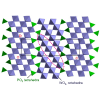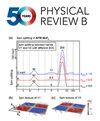Charge density waves and electron-hole instabilities of the hidden-nesting materials P4W12O44, γ- and η−Mo4O11
IF 3.7
2区 物理与天体物理
Q1 Physics and Astronomy
引用次数: 0
Abstract
The origin of the charge density wave (CDW) instabilities in the isostructural but not isoelectronic octahedral layers of the three-dimensional solids and is discussed on the basis of first-principles density functional theory calculations. These layers contain three different and superposed one-dimensional (1D) systems (two diagonal and one horizontal) associated with the three orbitals of the transition metal in octahedral coordination. Because of the special topology of the layers the three 1D systems are practically independent (hidden nesting) and the Lindhard function contains three different lines of intensity maxima associated with each of them. Clear cusps (six for and four for ) occur at the intersections of these intensity lines. The wave vector of the structural modulations associated with some of these cusps from our calculations is in good agreement with the observed CDW wave vectors. The nature of the different modulations is analyzed on the basis of the calculated thermal dependence of intrachain and interchain coherence lengths of the diffuse lines associated with the diagonal and horizontal chains. Modulation in the diagonal chains is found to be more favorable than in the horizontal chain. The same type of wave vector is selected for and despite having a different band filling. The coupling of the electronic instability to the phonon spectra and the relationship between the nature of the high-temperature modulation with the width of the octahedral layers is discussed. Among the two Magnéli phases the interlayer coupling is found to be somewhat stronger in . The relationship with other hidden-nesting series of materials as the rare-earth tellurides is commented.

隐巢材料 P4W12O44、γ- 和 η-Mo4O11 的电荷密度波和电子-空穴不稳定性
本文以第一原理密度泛函理论计算为基础,讨论了三维固体 γ-Mo4O11 和 P4W12O44 的等结构而非等电子八面体层中电荷密度波(CDW)不稳定性的起源。这些层包含三个不同的叠加一维(1D)系统(两个对角线系统和一个水平系统),与八面体配位的过渡金属的三个 t2g 轨道相关联。由于层的特殊拓扑结构,这三个一维系统实际上是独立的(隐藏嵌套),林德哈德函数包含与每个系统相关的三条不同的强度最大线。在这些强度线的交叉点上会出现明显的尖点(P4W12O44 为六个,γ-Mo4O11 为四个)。我们计算得出的与其中一些尖点相关的结构调制波矢量与观测到的 CDW 波矢量非常吻合。根据计算得到的与对角线链和水平链相关的扩散线的链内和链间相干长度的热依赖性,分析了不同调制的性质。结果发现,对角链中的调制比水平链中的调制更有利。尽管γ-Mo4O11 和 P4W12O44 的带填充不同,但它们选择了相同类型的波矢量。讨论了电子不稳定性与声子光谱的耦合以及高温调制的性质与八面体层宽度之间的关系。在两种马格尼里相中,η-Mo4O11 的层间耦合更强。并对其与稀土碲化物等其他隐巢系列材料的关系进行了评论。
本文章由计算机程序翻译,如有差异,请以英文原文为准。
求助全文
约1分钟内获得全文
求助全文
来源期刊

Physical Review B
物理-物理:凝聚态物理
CiteScore
6.70
自引率
32.40%
发文量
0
审稿时长
3.0 months
期刊介绍:
Physical Review B (PRB) is the world’s largest dedicated physics journal, publishing approximately 100 new, high-quality papers each week. The most highly cited journal in condensed matter physics, PRB provides outstanding depth and breadth of coverage, combined with unrivaled context and background for ongoing research by scientists worldwide.
PRB covers the full range of condensed matter, materials physics, and related subfields, including:
-Structure and phase transitions
-Ferroelectrics and multiferroics
-Disordered systems and alloys
-Magnetism
-Superconductivity
-Electronic structure, photonics, and metamaterials
-Semiconductors and mesoscopic systems
-Surfaces, nanoscience, and two-dimensional materials
-Topological states of matter
 求助内容:
求助内容: 应助结果提醒方式:
应助结果提醒方式:


